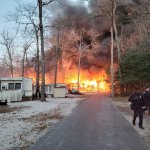RIO GRANDE – The new Starbucks on Route 9 in Rio Grande, across the busy road from its former location, is open.
The only Cape May County location outside of Ocean City for the caffeination giant, the new site includes a drive-thru window. The steamers are working, the espresso packed and the drip coffee hot, but there was one final detail to be resolved: An appeal of the Middle Township Planning Board decision approving the new site.
The owner of the former Starbucks location did not want to see its tenant leave and went to court in an attempt to prevent that happening. A New Jersey Appellate Court recently upheld a trial court’s decision that the approvals needed for the new building were valid.
Delco, LLC, which owns the strip of stores on the west side of Route 9 that was the former home to the Starbucks, went to court over the Planning Board’s approval of plans for the new location.
The developer, InSite Development Services, LLC, applied for Planning Board approval for the new building in September 2016, according to Robert Beckelman, an attorney representing InSite.
According to court documents, the Planning Board approved several variances for the new building, but initially balked at a variance for the required number of parking spaces. A vote on that tied up at 3-3.
This gets to the crux of the legal matter.
“Rather than have the application go down to defeat, InSite’s attorney requested the board carry the application to permit the applicant to revise the parking. The board agreed,” reads the appellate court decision.
In the original application, the developer calculated 41 parking spaces were required based on the township ordinance. Plans called for 26 spaces, requiring a variance. The parking requirements were based on the number of seats and the square footage of the business devoted to customer service, in this case, 52 seats and 1,399 square feet for customer service.
But, according to the court documents, even at the original application, board members questioned the formula, which included the seating area in the square footage and included the seats themselves. One board member asked whether that counted as a double dip, according to the appellate decision.
With one variance denied, the applicant delayed the final vote. By the next meeting, in November 2016, the applicant revised its calculation to exclude the seating area and the restrooms from the square footage calculation, which cut the required number of spaces to 18. The board’s engineer agreed with this calculation, and the Planning Board approved the application without a parking variance.
In early 2017, Delco filed a complaint seeking to overturn the approval, arguing that carrying over the application to another meeting after denying the parking variance was arbitrary and capricious and that the interpretation of the ordinance was wrong.
Superior Court Judge Julio Mendez heard the case in July 2017 and by October 2017 had rejected Delco’s arguments. Delco appealed that decision. In a Jan. 31 opinion, a three-judge appellate panel affirmed Mendez, describing his decision as “clear and comprehensive.”
Mendez, and the appellate court, cited an applicant’s “well-settled” right to modify an application or clarify any relief requested.
“The judge also emphasized that Delco’s due process rights were never compromised by the decision to continue the application,” reads the appeal decision. “Judge Mendez found Delco had notice of the modified plans and ‘every opportunity to participate and challenge the application at both hearings and did so.’ Because he concluded the decision to carry the application was not arbitrary but well within the board’s considerable discretion as a quasi-judicial body, Mendez rejected Delco’s claim of procedural error.”
Beckelman, the attorney representing the developer of the new site, declined to comment on the decision other than to say he was pleased.
Attorney William Kaufman, representing Delco, did not respond to a request for comment, nor did attorney David Stefankiewicz, who argued the case on behalf of the Middle Township Planning Board.
Starbucks originated in Seattle in 1971 and has grown into a global brand with more than 29,000 retail stores around the world. No one from the corporate press office responded to a request for comment.
To contact Bill Barlow, email bbarlow@cmcherald.com.
Cape May County – I believe it is time that California be returned to the indigenous people who lived there. They understood the land and the weather and built dwellings made as part of the earth and took care of the…








